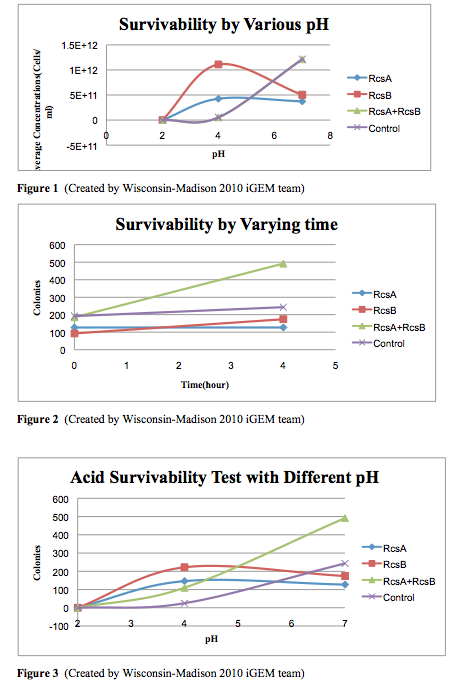Team:Wisconsin-Madison/results
From 2010.igem.org
(→Low pH Induction) |
(→Stationary Phase Induction) |
||
| Line 105: | Line 105: | ||
===Stationary Phase Induction=== | ===Stationary Phase Induction=== | ||
| - | + | See procedure at experimental protocols page. | |
===Conclusion=== | ===Conclusion=== | ||
Revision as of 17:19, 27 October 2010
Encapsulation
| Part Number | Function | Expression Type | Zip File |
| <partinfo>BBa_k318500</partinfo> | Produces Trascription Factor RcsB | Inducible - IPTG | 500 |
| <partinfo>BBa_k318501</partinfo> | Produces Trascription Factor RcsA | Inducible - IPTG | 501 |
| <partinfo>BBa_k318502</partinfo> | Produces Trascription Factor RcsA & RcsB | Inducible - IPTG | 502 |
| <partinfo>BBa_k200021</partinfo> | Empty Vector/Contol | Inducible - IPTG | NA |
Colonic Acid Quantification
Background
Colonic Acid is a polysaccharide containing a repeat unit with D-glucose, L-fucose, D-galactose, and D-glucuronate. Biological extracts often contain compounds, which under heating with H2SO4 yield brown products absorbing between 396 nm and 427 nm. Colonic acid can be estimated by measuring L-fucose content.
Download procedure here or continue to experimental protocol page
Results
Conclusion
Cell Survivability in Low pH
Background
Download procedure here or continue to experimental protocol page
Results
Conclusion
Timed Lysis
| Part Number | Function | Induction | Zip File |
| <partinfo>BBa_k318513</partinfo> | Produces RFP | stationary phase | 513 |
Background
gadAp: A pH Sensitive Promoter Based on available literature (cite), we expected an increase in expression from gadAp (BBa_K318512) under both acidic pH conditions (from pH 5 to 3) and in the stationary phase (after an OD of 1 or 2). In order to test this, we combined the gadA promoter with a RFP gene (BBa_K318513). This part
Low pH Induction
See procedure at experimental protocols page.
Stationary Phase Induction
See procedure at experimental protocols page.
Conclusion
 "
"
